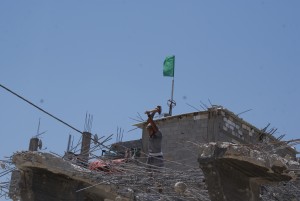Ahmadinejad and his image problem
The unpolished US appearances of Mahmoud Ahmadinejad's demonstrate just how bad at modern diplomacy the regime in Tehran is.
I am no fan of Mahmoud Ahmadinejad‘s hardline politics which are playing straight into the hands – or more accurately the talons – of Washington hawks. But I felt a certain twinge of sympathy for the Iranian president, and more so for the Iranian people, at his sorry bungling of his US charm offensive.
His ineptitude was almost as painful to watch as the deafening beating of war drums by the well-oiled US corporate media machine.
Decked out in his shabby and ill-fitting suit, Ahmadinejad cut less the figure of an international statesman and more one of what we call in Egypt the muwazaf: the downtrodden, underpaid civil servant, dishevelled from too much exposure to grinding poverty and tin-pot public transport, plodding home with a newspaper under one arm and a watermelon under the other.
The expression of constant dread and disorientation on his face gave the impression that some low-level functionary had been teleported to the Big Apple from his dusty cubby-hole in a Tehran ministry to speak on behalf of Iran. And his troubles did not stop with his wardrobe.
Of course, even Alastair Campbell would've had his work cut out spin-doctoring Ahmadinejad's image amid the frenzied and cynical anti-Iranian harm offensive that has already conquered large swathes of America. Nevertheless, we have to ask: does the Iranian regime have any international media and political advisers?
If it does, were these consultants napping when Ahmadinejad accepted the invitation to Columbia University? It is common practice, especially in America, for politicians to prearrange the minutest details of their appearances before accepting invitations, including how they will be introduced, vetting the questions they will be asked, how much talktime they will receive, and so on.
I doubt Ahmadinejad had much foreknowledge of the tirade of abuse with which Columbia University's president Lee Bollinger introduced him, saying the elected Iranian president exhibited “all the signs of a petty and cruel dictator”, among other things. A stunned Ahmadinejad was only able to respond that he found the comments an “insult”.
A German friend wondered what the reaction would've been if US president George Bush were invited to, say, a German university and then introduced as “a war criminal and mass murder” by his hosts. Even the conservative Jerusalem Post was moved to observe that: “The media had reported that this was a ‘speech' or ‘debate', but after Lee Bollinger's introduction, it became a trial.”
No matter what Bollinger's personal feelings are on Ahmadinejad's ridiculous, insulting and ambiguous stance on the Holocaust and the Iranian regime's human rights record, he broke both the basic rules of decorum and free debate in a disgraceful fashion. A moderator introducing a debate should, as his function suggests, project a semblance of impartiality and give the speakers a chance to express their views, leaving the audience to decide for themselves.
Of course, there are issues that even top media consultants, if Iran had them, would not be able to put a positive spin on, such as Ahmadinejad's farcical remark that Iran does not have homosexuals. But then the current Iranian president is not famed for his grip on reality, such as his suggestion to a group of journalists, when discussing the racially offensive film 300, that Iran had never invaded any country in its history.
His “firm no” to questions on CBS's 60 Minutes programme regarding Iran's suspected ambitions to build a nuclear bomb and his more articulate explanation of his motivation for wanting to visit Ground Zero were a slightly better performance, but one cannot help but miss his predecessor, the reformist Mohammad Khatami, both for his more enlightened politics and his milder manner. Elaine Sciolino, author of Persian Mirrors, was also bowled over by his dress sense and his immaculate shoes. In Iran, he has been described as the “man with the chocolate robe”.
But those heady and hopeful days of striking a dialogue among civilisations and modernising Iran seem to be giving way to those who foresee an all too unnecessary clash of civilisations in Washington and Tehran.
Sadly, it would seem that Ahmadinejad's inept attempt to charm his country out of harm's way has backfired spectacularly and, if anything, the prospect of a reckless and destructive American attack on Iran seems ever more imminent.
_______
This article first appeared in The Guardian on 26 September 2007.


